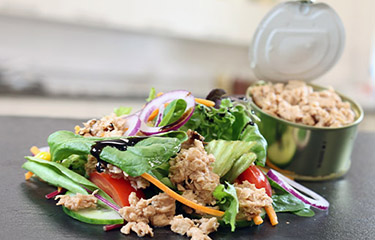SeafoodSource is closely following the plant-based and cell-based seafood alternatives market by compiling a regular round-up of updates from the sector.
- Loryma wheat ingredient company announced the debut of its tuna analog, sourced from wheat-based ingredients, described as a “canned tuna alternative."
The Zwingenberg, Germany-based company announced the development of “several application recipes” for its tuna analog, alongside the debut of its Lory Tex Snips and Lory Tex Fibres tuna analogs, which aim to replicate the realistic texture of real tuna by blending protein fibers together and rehydrating them with water.
“Fish stocks are becoming increasingly scarce due to overfishing of the oceans. Therefore, we offer a sustainable, authentic alternative using wheat, which we source mainly regionally in Germany,” Loryma Head of Research and Development Nobert Klein said in a release. “The sensory properties of our vegan version are every bit as good as the original. In addition, we are more than happy to support our customers in the development process and to customize the concept according to their own ideas.”
-Sao Paulo, Brazil-based JBS Foods Brazil has celebrated the groundbreaking on its Biotech Innovation Center in Sapiens Parque, Brazil, which will develop cell-based protein which is slated to open in late 2024. The company said it is building the facility to make its cell-cultured protein production more efficient and economically competitive.
According to Just Food, the centre will require USD 62 million (EUR 58 million). Upon completion, the center will the largest biotechnology research center in Brazil.
Although the U.S. and Singapore have been the only two countries to approve the commercial sale of cell-based meat, JBS has been pushing Brazil to grant its own approval since 2021, when it acquired a majority stake in cultivated protein firm BioTech Foods.
- Cell-cultured seafood company Steakholder Foods has received a patent for an enhanced bovine cell creation process that will create so-called "immortal cell lines.
"In 100 generations of replications, a single cell in an immortal cell line could theoretically produce more than 3,250 trillion tons of meat. With around 350 million tons of meat consumed annually, immortal cell lines are paving the way to ensuring slaughter-free meat supply for the foreseeable future. This isn't merely a technological milestone; it's a paradigm shift in how we envision food production for the future,” Stakeholder Foods CTO Dan Kozlovski said in a release.
Photo courtesy of Loryma







